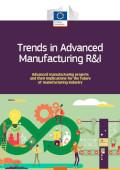What is advanced manufacturing?
Advanced manufacturing refers to the integration of innovative technologies and smart processes that enhance the efficiency, flexibility and product quality of modern production environments. It combines robotics, automation and artificial intelligence (AI) with data-driven insights to create smarter and more resilient manufacturing systems.
For example, robotic automation is widely used in automotive assembly lines to ensure precision in welding and part assembly. In aerospace, additive manufacturing (3D printing) enables the production of complex, lightweight parts that are difficult to create using conventional methods. Meanwhile, smart factories leverage the Internet of Things (IoT) to monitor operations in real time, improve efficiency and prevent downtime through predictive maintenance.
AI technologies enhance supply chain optimisation and production planning, and advanced materials like carbon fibre are used to manufacture durable, lightweight components in both the automotive and aerospace industries. High-precision techniques, such as laser-cutting are also critical in electronics manufacturing.
By enabling rapid innovation and customisation, advanced manufacturing helps companies stay competitive in the global economy and transition towards more sustainable, digital and circular production systems.
Why advanced manufacturing matters
The manufacturing sector plays a vital role in Europe’s economy and innovation ecosystem.
- It employs 29.7 million people, representing 19% of total EU business economy employment (source: Key figures on European business – 2024 edition, p. 30)
- It generates €2.2 trillion in value added, equal to 23.7% of the EU business economy (source: Key figures on European business – 2024 edition, p. 30)
Research institutes, universities and small and medium-sized businesses (SMEs) are key drivers of innovation in the sector, making manufacturing a cornerstone of Europe's digital and green transition.
Horizon Europe Partnership Made in Europe (MiE)
Made in Europe (MiE) is the EU’s key public-private co-programmed partnership supporting the transformation of the manufacturing sector. Co-programmed under Horizon Europe, the MiE initiative runs from 2021 to 2027 with a total budget of €1.8 billion.
Led jointly by the European Commission and the European Factories of the Future Research Association (EFFRA), Made in Europe aims to strengthen the global competitiveness and innovation capacity of European manufacturing.
It builds on the Factories of the Future Partnership, previously funded under Horizon 2020.
Key Objectives:
- Digitalisation of manufacturing processes and value chains;
- Promotion of circular economy models and sustainable production;
- Development of new industrial services and business models;
- Creation of human-centric workplaces that attract and retain talent in the EU.
By focusing on these priorities, the partnership supports the development of a competitive, green, digital, resilient and human-focused manufacturing sector. MiE plays a central role in Europe’s digital and green transition, both as an enabler and as an actor undergoing transformation.
Looking ahead to 2030, the vision of Made in Europe is to reinforce Europe's position as a global leader in industrial productivity, technology innovation, and sustainable manufacturing excellence.
Subscribe to our newsletter for updates on research and innovation in industrial transformation.
Trends in advanced manufacturing research and innovation
In November 2023, the Commission published a report which looks into the portfolio of EU projects supporting advanced manufacturing, mostly under the partnerships Factories of the Future and Made in Europe. From 2010 until 2023, a total of €2.2 billion has been invested in these R&I projects. The report also analyses the trends in manufacturing industry and the vision of various stakeholders.

- Report
- 28 November 2023
Advanced manufacturing projects and their implications for the future of manufacturing industry
